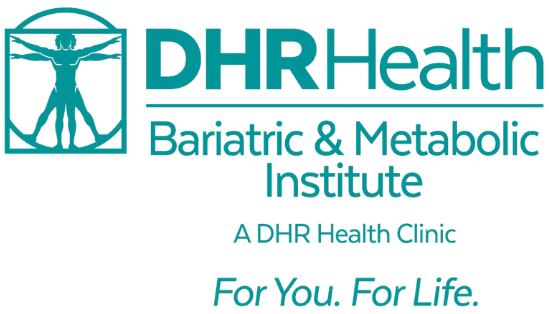Over the last several decades, the obesity rate throughout the nation has been consistently on the rise. Currently, nearly 70 percent of adults in the United States are overweight, with over 30% qualifying as obese. The effects of obesity can be very serious, ranging from heart disease to joint pain and arthritis. Because of this, obesity should not go untreated for long.
If you are struggling with obesity and are seeking medical assistance, the Doctors at DHR Health Bariatric and Metabolic Institute is here to help. With a compassionate team of weight loss professionals, we are prepared to offer the best medical and surgical support possible, from bariatric procedures to fitness groups, with the aim of helping you return to a healthier lifestyle.
What Is Obesity?
Simply put, obesity is the state of having too much body fat. A person with a body mass index, or BMI, of 30 or higher is considered obese. In general, obesity is caused by eating too many calories without adequate physical activity.
Obesity is a chronic condition that has a serious impact on the body as a whole. An increased level of fat can negatively affect the body’s ability to function. Obesity often leads to complications including diabetes, cardiovascular disease, and respiratory distress.
- Excess weight of 100 pounds or more
- A BMI of 40 or greater, or a BMI of 35 or greater with an associated weight-related medical problem, such as diabetes or heart disease
- Age 18 or older; exceptions may be made for those 16 to 18 with an appropriate BMI
- A documented history of years of effort attempting to lose weight through diet and exercise without success

The Effects of Obesity
Obesity has many effects on patients’ physical, psychological, and social health.
Physical Effects
The physical effects of obesity are the most pronounced, leading to numerous health issues and reducing life expectancy by up to nine years.
Type 2 diabetes is among the most common side effects of obesity. Also known as adult-onset diabetes, this condition is caused by chronic high blood glucose levels. High percentages of fat can compromise the body’s ability to control blood sugar, leading to a strong connection between obesity and diabetes. Diabetes, which affects more than 10 percent of the population, can cause severe diabetic blindness, end-stage kidney disease, and circulation problems that can lead to amputation of lower extremities.
Obesity also has strong ties to heart disease, with high body weight contributing to the build-up of fatty substances in the arteries. High blood pressure and high cholesterol, which are also effects of obesity, can further increase the risk of heart disease. These factors can lead to an increased chance of heart attack or stroke, resulting in the premature death of thousands of patients.

Other physical effects of obesity include:
- Fertility problems
- Non-alcoholic fatty liver disease
- Increased risk of some cancers
- Circulation problems
- Joint pain in the knees, hips, and ankles
- Arthritis and rheumatoid arthritis
- Migraines
- Sleep apnea
- Liver disease
- Asthma
- Gallbladder disease
- Heart disease
- High blood pressure
- GERD
- Type 2 Diabetes
- Urinary incontinence
- Osteoarthritis
- Menstrual/fertility problems
- Venous disease and leg swelling
- Gout
Psychological Effects
Obesity’s effects don’t stop at physical risks to the body. Many obese individuals also experience psychological symptoms, including depression and anxiety. Studies indicate that those suffering from increased weight rate their quality of life lower than healthy individuals do. Obese individuals often experience low self-esteem and body dissatisfaction.
Social Effects
Those who experience a psychological toll from obesity often struggle socially as well. They may be subject to discrimination and prejudice, limiting social activities and leading to loneliness and isolation. These feelings can also lower educational attainment and employment, as affected individuals often feel forgotten and neglected by society. In addition, excess weight can prevent obese individuals from participating in sporting events and other physical activities, losing out on important interactions with peers.
Explore Bariatric Surgery
While the effects of obesity can be quite serious, losing even 10 percent of body weight can drastically reduce risks. If you are seeking a way to lose weight and feel better, bariatric surgery may be the right solution for you.
If you would like to learn more about how to lose weight safely and effectively through bariatric surgery, DHR Health Bariatric and Metabolic Institute is here. Contact us today to learn more!


